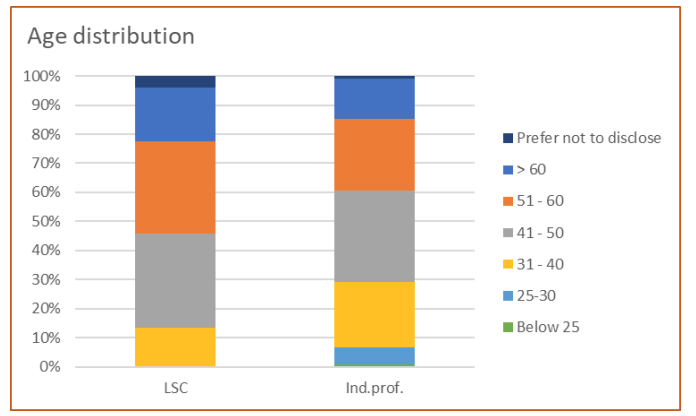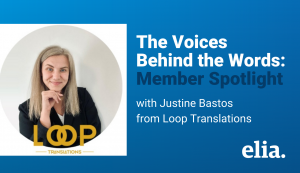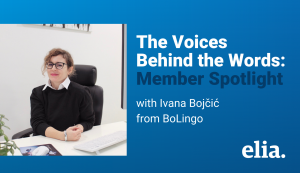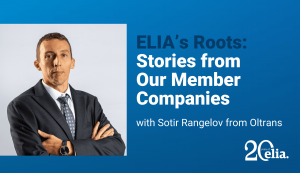The language services industry is aging. According to the 2025 European Language Industry Survey (ELIS), the median age of LSC respondents is now 55, and 18% are over 60. Meanwhile, despite efforts to reach out to young professionals, those under 30 remain significantly underrepresented.

This raises important questions about succession, innovation, and the future leadership of LSPs. How are companies planning for transition? Where is the next generation of talent coming from—and will they even choose to work in traditional language service companies?
In this next article in ELIA’s ELIS 2025 Discussion Series, Anu Carnegie-Brown (ACB), Ursula Steigerwald (US), and Stéphane Hue (SH) revisit the topic of age and innovation in LSPs (building on last year’s discussion) and explore new angles: employee ownership, family succession, internal leadership development, and the role of “shadow boards” in keeping decision-making fresh.
Generational Transitions and Succession Planning
ACB: In the UK, selling a business to an employee ownership trust (EOT) is a tax-efficient exit strategy that offers significant benefits to the exiting shareholders, the employees, and the business itself. It works well for shareholders looking to exit from a business while safeguarding the company’s legacy and taking care of its employees. It’s also a great option where there is no obvious opportunity for a trade sale or management buy-out. Business owners who are heavily involved in day-to-day operations can gradually transition away, allowing time for leadership succession. Here’s how we did it at Sandberg in 2023.
Company Age Demographics
ACB: Last year I reported that at Sandberg, the average staff age in July 2024 was 37 years, with an average length of service of 6 years. In May 2025, the average age remains 37, and the average tenure has increased slightly to 6.7 years.
SH: At EuropaTrad, our average employee age in 2025 is 39.7 years, with an average tenure of 8.6 years. Taking consideration of this is an indication of the experience, knowledge and dedication of people that make the company, but is also a reminder that companies have to make sure that younger employees keep the balance right.
US: At Rheinschrift Language Services, the average age is 38.4, and the average length of service is 9.6 years. Behind these figures you can find a number of employees being with us for 15 or 20 years and more with a lot of experience as well as a number of young people under or around 30 years of age who have the tech savviness and huge interest in developing new solutions that we need in order to evolve as a company and get ready for the future.
Motivation from Within: Taking Over the Family Business
If you are a young professional person who has grown up seeing the ins and outs of the language services industry at very close quarters, is there anything that could possibly motivate you to take over the management of the family LSP from your parents? We asked two engaged ELIA members who had done exactly that:
“It all started as I had this strong feeling of pride about the legacy my mum had built over the previous 16 years. I had this aspiration that one day I would be as influential as she is—she was a role model, not just for me, but for everyone around.
I tried every single department, and this is something I will always be grateful for—translation, DTP and engineering, project management, HR, finance… I eventually settled in business development and client relations. Working with people from all over the world is what keeps me ignited. It’s been continuous mentorship and training from everyone around—team leads, top management, and my mother herself. I also got my MBA. I keep learning, and I grow as part of a team.
In this major, disruptively innovative era we are in, challenges are endless. The biggest personal one is carrying the 30-year legacy and meeting everyone’s expectations—including your own—while leaving your own print and doing things your own way. Knowing when to follow and when to rebel is a key challenge—and also a key part of sustaining success.
My advice is simple: it’s not an easy job—psychologically, more than technically. So love what you do. If you don’t have the passion, you won’t maintain the momentum. If you have the will, you will find the way.”
“Our family business was established 36 years ago, when I was 7 years old. My older sister was 9, and our youngest sister wasn’t even born yet. The business was a topic at home. We stayed late at the office with our mum, we were involved in small tasks, and we even played games using translators’ names. It all felt like home—so taking over came naturally. We didn’t think it over; it just happened.
There was no formal training period. We were involved from the very beginning and aware of how things worked. It’s like growing up on a farm and being trained to milk a cow—you see it and hear about it every day.
The challenge is to convince the previous generation that you know what you’re doing, that you won’t ruin the business they’ve been nurturing with so much care. But the problem is that you can’t prove that until they let go of management and decision-making—and they won’t let go until they’re convinced. It becomes a vicious circle.
My advice is to be patient and understanding. Show with little steps that you are trustworthy.”
Ultimately, it seems that what emerges as the cornerstone motivation for these young entrepreneurs is passion. The next generation understands that success in this field is not just about technical expertise but also about psychological resilience and unwavering commitment. By embracing this passion, they ensure they maintain momentum, innovate, and carry forward the legacy with vigor and vision.
Giving the Next Generation a Voice: Shadow Boards
One approach to bridging this generational gap is through shadow boards. These are advisory groups made up of younger employees who work alongside senior leadership to offer new perspectives and challenge traditional thinking.
SH: Are shadow boards exclusively for large corporations? For SMEs, this might seem daunting—first, you need a board, and then a shadow board. The company might not even have enough personnel for that. However, any company can promote young representatives and future managers to any formal decision-making or advisory group. For instance, an Employee Resource Group or a Young Employee Council. The idea is to give the young people in the company a voice. It could even be that the MD has a younger colleague as a ‘shadow person’.
Where Does Innovation Sit in Your Company?
US: Age does not always seem to be the defining criterion. Employees of all ages should be involved in decision making processes and in defining the path for the future. When young and promising employees with a clear potential are involved at an early stage and can learn from the existing team without feeling “patronized”, it might well happen that the next gen leaders can be found from within and the current leader(s) can slowly step back and hand over.
SH: Given the current landscape, it seems advantageous for many companies to consider promoting younger employees to management positions, potentially bypassing more experienced or tenured individuals. This approach has historically been a hallmark of agile and fast-moving companies, making it particularly relevant in today’s environment where adaptability and change are paramount. This strategy might even be relevant for company owners, who are accustomed to managing every detail, to consider relinquishing some control to facilitate necessary change.
Who’s Building the Future of LSPs?
The 2025 ELIS data shows what many of us already sense: our industry is ageing, and younger professionals remain underrepresented—especially in leadership roles. With many LSC owners approaching retirement, the question isn’t if leadership change is coming, but how we’ll navigate it.
Some companies will look outward—to employee ownership, external buyers, or new leadership hires. Others will focus inward—mentoring younger team members, involving them in decision-making, or gradually handing over family businesses.
But no matter the route, one question remains: are we doing enough to make the language services industry an appealing and empowering place for the next generation to grow?
How is your company approaching leadership succession and generational change?
Join the conversation on LinkedIn using #ELIAdiscussion and tell us what the future looks like in your LSP.







